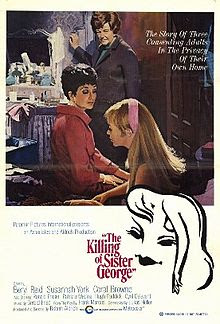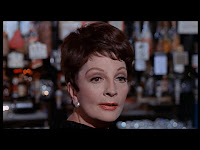 Robert Aldrich’s stunning movie of Frank Marcus’s Broadway hit play was way head of its time when it was released in 1968. It was one of the first to ever get an X rating from the Censors, the Catholic Church loudly condemned it as ‘immoral trash’, respected Film Critics of the day bitterly dismissed it, and the audiences, especially American ones, stayed away in droves. And all because this hilarious drama not only dared to address lesbianism, but chose to do so in an honest non-exploitative fashion.
Robert Aldrich’s stunning movie of Frank Marcus’s Broadway hit play was way head of its time when it was released in 1968. It was one of the first to ever get an X rating from the Censors, the Catholic Church loudly condemned it as ‘immoral trash’, respected Film Critics of the day bitterly dismissed it, and the audiences, especially American ones, stayed away in droves. And all because this hilarious drama not only dared to address lesbianism, but chose to do so in an honest non-exploitative fashion.Set in Britain, its a story of an older woman going through a late middle-age crisis. George is an actress, and the star of TV soap opera where she plays the village nurse who is beloved by all the locals for her kindness and her charming words of wisdom that she bestows on them all. Off the set, however, she is a rather unbearable drunken foul-mouth woman who is constantly paranoid that the Station are always just about to fire her.
 When she gets home she takes her rages out on her much younger girlfriend Childie who lives in fear of what she may do next. They are both right to be worried about their future as one day Mrs Croft turns up at their apartment totally unannounced. She is a brittle uptight snobbish Studio Executive who has come to tell George that she is in fact through, but before she can get to doing just that, she too takes a shine too Childie so much so that offers her a Screen Test as a means to lure her away. When George finds out, all hell lets loose. Literally.
When she gets home she takes her rages out on her much younger girlfriend Childie who lives in fear of what she may do next. They are both right to be worried about their future as one day Mrs Croft turns up at their apartment totally unannounced. She is a brittle uptight snobbish Studio Executive who has come to tell George that she is in fact through, but before she can get to doing just that, she too takes a shine too Childie so much so that offers her a Screen Test as a means to lure her away. When George finds out, all hell lets loose. Literally.Much of the actual intimacy is inferred (God forbid, anyone should mention anything approaching the L word) apart from one clumsy scene at the end which was the reason for the Rating, even though we would view it as far from sexy now, and simply positively creepy.
The success of the piece is due not just to Aldrich’s innovative direction, or the script that Lukas Heller helped Marcus adapt, but essentially for the outstanding casting. Beloved British comedienne Beryl Reid who so very much made the role of George her own when the play opened in London’s West End, that the Producers took a chance and asked her to reprise the role on Broadway and she repaid them by winning a Tony. She was then a shoe-in for the movie even though totally unknown to US audiences, and in a performance where she steals every single one of her scenes, she still picked up a Golden Globe Nomination even though the movie itself was universally shunned.
Childie was played by Susannah Yorke, and the steely conniving Mercy Croft was another sublime performance from Coral Browne.
I’ll admit to a small bias (I saw Reid perform this on the stage in 1965 and when the curtains came down at the end of Act 1, we could hear the cast roar with laughter and we knew that she had ad-libbed her way through it yet once again) but her sensational career best performance should not be missed. And this controversial ground-breaking movie should be considered nothing less than a classic gay masterpiece!
P.S. Remarkably, it wasn’t until 2007 that American TV audiences in a very rare broadcast actually got to see the full uncut version thanks to TCM.



